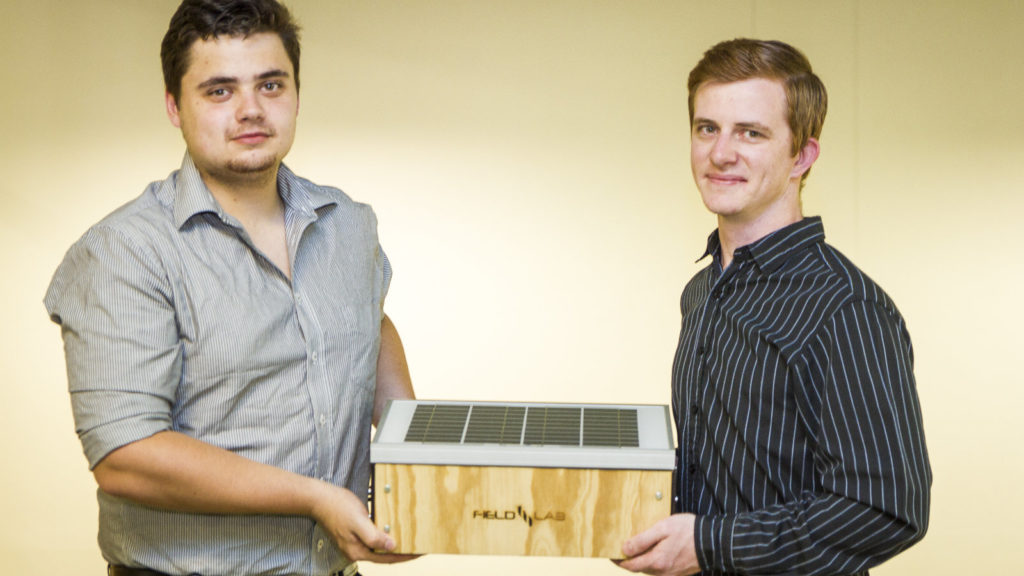LG’s 100-Inch QNED evo AI TV Redefines Big-Screen Viewing in South Africa In a bold leap forward for home entertainment, LG Electronics South Africa…
SA startup Akili Labs to exhibit affordable mobile lab at US tech conference

Award-winning SA biotech startup Akili Labs has been selected to exhibit their mobile laboratory at the Collision Conference, one of the fastest growing tech conferences in the US. The conference takes place between 30 April and 3 May in New Orleans.
The startup, based in Grahamstown in the Eastern Cape, has developed an award-winning low-cost medical diagnosis mobile laboratory to help detect viral and bacterial infections.
Last year the startup won R50 000 for the best prototype prize at the Department of Science and Technology’s Innovation Bridge. In addition, the startup was awarded R500 000 seed funding after taking first place in the GAP BioSciences competition.
In an email yesterday, Akili Labs co-founder Charles Faul (pictured above, right) — who founded the startup with Lucas Lotter (pictured above, left) last year — said the company plans to exhibit one of its mobile laboratory concepts — the Field Lab.
The Field Lab — which consists of a centrifuge, light microscope of 1000x, thermocycler and an agarose gel electrophoresis system — is capable of running multiple diagnostic tests in parallel and can detect pathogens at a genetic level. It also has an interactive touch interface which guides users through the diagnostic process.
The latest news follows an invitation the startup received last year to showcase the Field Lab at an internal Unicef event in Tokyo which took place in December.
Akili Labs Field Lab biotech innovation can quickly and accurately detect pathogens at a genetic level
In the last four months, the startup has been working on a production prototype of the Field Lab. The founders aim to develop the kit into a mobile laboratory which can diagnose HIV, the Zika virus, HPV, and Hepatitis A and E in rural areas with little to no infrastructure.
“Field Lab is aimed at assisting in the decentralisation of medical diagnostics to improve diagnostics in rural areas, disaster areas and conflict zones by offering the capabilities of a diagnostic laboratory in remote areas through the modular Field Lab system,” said Faul.
The startup, which works in partnership with the Rhodes University Biotechnology Innovation Center (RUBIC) and Unicef, has already piqued the interest of the Red Cross and Médecins Sans Frontières (MSF).
“The Red Cross has contacted us to determine when the system will be operational and available so we are aiming to get the first units to them and will aim to build a relationship in support of the work they do,” said Faul.
He added that Akili Labs is currently in discussions with MSF around a similar arrangement the startup is setting up with the Red Cross.
“We are still in the very early stages but the interest in the system has been an indicator for us that this is a field of high importance that requires innovation and disruption to improve it and save lives,” he said.
Low cost modular system
The startup aims to keep the total unit cost of each Field Lab unit to under $3000 — dependent on the kind of unit a user will require. In comparison, conventional equipment with similar capabilities can cost around $23 000.
Faul expects that each unit will have a lifespan of up to 10 years and said the startup plans to shortly carry out a stress test on the unit. He added that the modular nature of the lab box will allow for faulty components to be replaced easily.
“It will be upgradable, which in the laboratory equipment and medical diagnostic equipment market is very rare,” he added.
Since it launched last year, the startup has raised over R1.2-million in funding, mostly through competitions, with R250 00 of this from a private equity deal with an undisclosed investor.
The startup has also received support from hardware technology incubator Savant and The Innovation Hub.
Lack of facilities
Faul said due to a lack of facilities and equipment, the startup has had to be innovative in the design of the mobile laboratory.
“We have had to re-engineer solutions and build a lot of hardware into a very small space, all the while trying to maximise functionality and minimise weight and energy consumption,” he said.
But he said that the support the startup has received from RUBIC, Savant and The Innovation Hub has helped the startup to address this and other problems — such as access to laboratory facilities and equipment.
Featured image: Akili Labs founders (from left to right) Lucas Lotter and Charles Faul (Supplied)


